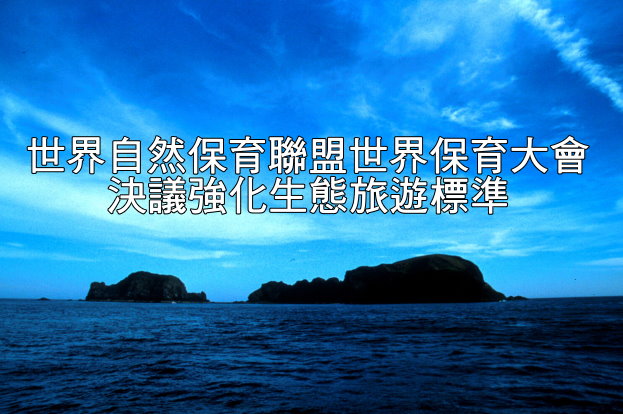
世界自然保育聯盟世界保育大會決議強化生態旅遊標準
Improving standards in ecotourism
賴鵬智翻譯
世界自然保育聯盟(IUCN)於2016年9月1日至10日假美國夏威夷舉辦世界保育大會(World Conservation Congress),會中決議強化生態旅遊標準,以下是該決議內容中文翻譯,敬請參閱並請指正:
【本文】
觀察到2014年全球旅遊產值達1兆2千億美元(將近全球國內生產毛額的10%),全球每11個工作就有1個跟旅遊有關,而旅遊業也是全世界最大且最快速成長的產業之一。
OBSERVING that in 2014 tourism contributed USD 1.2 trillion (nearly 10% of global Gross Domestic Product) to the global economy, accounted for 1 in 11 jobs worldwide, and is one of the largest and fastest-growing economic sectors in the world;
認識到聯合國永續發展目標之第8、12與14項已將旅遊列為永續經濟成長、永續消費及生產、保育及永續利用自然資源及自然遺產的有效工具。
RECOGNISING that tourism has been highlighted in United Nations Sustainable Development Goals 8, 12, and 14 as a tool for sustainable economic growth, sustainable consumption and production practices, and for the conservation and sustainable use of nature and natural heritage;
進一步觀察到以自然取向的旅遊型態是旅遊業發展要素,撐起全球25%的旅遊市場。
FURTHER OBSERVING that nature-based tourism is a major tourism sector, making up more than 25% of the global travel market;
注意到「生態旅遊」一詞已經廣泛運用在這一類的旅遊上,但政府、非政府組織與旅遊業者常有不同的定義或闡述,而生態旅遊、自然取向的旅遊以及地質旅遊(以地質多樣性及地質遺產為基礎的旅遊)在目前也少有精確的標準。
NOTING that the term ‘ecotourism’ is frequently applied to this type of tourism but that governments, NGOs, and the tourism industry have overlapping yet differing definitions, interpretations, and few precise standards for ecotourism, nature-based tourism or geotourism (based on geodiversity and geological heritage);
瞭解到聯合國大會在「推廣生態旅遊以消除貧窮及保護環境」議題的決議,生態旅遊為生物多樣性及自然地區的保育、保護及永續利用創造了良好契機,
AWARE that the UN General Assembly adopted a Resolution for the Promotion of ecotourism for poverty eradication and environmental protection and believes that “ecotourism creates significant opportunities for the conservation, protection and sustainable use of biodiversity and of natural areas”;
同時認識到世界自然保育聯盟同意「如果謹慎地建構,並有良好地管理與嚴格地管控,生態旅遊會是永續發展的動力」,而已經開展的各項重大工作(例如準則與研習工作坊)則有助於精進旅遊業的發展與運作;
ALSO RECOGNISING that IUCN agrees “ecotourism can be a driver of sustainable development…if it is carefully conceived, well-managed and strictly controlled” and has undertaken significant work (e.g. guidelines and workshops) to help improve development and operation of tourism;
憂慮各方的努力尚未改善全球的旅遊實務,尤其一般旅遊操作或活動常假借生態旅遊名義而嚴重衝擊到社區、生物多樣性、地質多樣性、地質遺產、潛力地景、野生物以及自然環境等;同時
ALARMED that collective efforts have not yet resulted in improved practices globally and that ecotourism can be often associated with tourism operations and activities that have severe negative impacts on communities, biodiversity and geodiversity, geological heritage, places of geological interest, wildlife and the natural environment; and
回顧11.8「平衡旅遊」(班夫,1972),1.32「生態旅遊及保護區保育」(蒙特婁,1996)及5.114「促進永續旅遊、郊區發展與自然遺產價值」(濟州,2012)等各重要國際會議的決議,闡明了發展旅遊的好處,不過也提醒我們,如果缺乏對產業實務的監督、照管與經營管理,則可能對人類及自然產生不好的後果;
RECALLING Resolutions 11.8 Balanced Tourism (Banff, 1972), 1.32 Ecotourism and Protected Areas Conservation (Montreal, 1996) and 5.114 Promotion of sustainable tourism, rural development and the value of natural heritage (Jeju, 2012), which further illuminate the benefits of tourism but remind us of the negative consequences to people and nature because of a lack of monitoring, oversight, and management of industry practices;
2016年9月1日至10日假美國夏威夷舉辦的世界保育大會,決議如下:
The World Conservation Congress, at its session in Hawai‘i, United States of America, 1-10 September 2016:
1.要求主席、各委員會及會員們稟持「壹計畫」精神支持及倡議以下事項:
1. REQUESTS the Director General, Commissions and Members to support an initiative, in the spirit of the One Programme, to:
a.在世界自然保育聯盟計畫裡,確保清楚認知生態旅遊會對環境、經濟及社會帶來的衝擊與機會;
a. ensure that environmental, economic and social impacts and opportunities of ecotourism are sufficiently acknowledged in the IUCN Programme;
b.延伸包含生態旅遊最佳實務在內的永續旅遊準則,含括世界自然保育聯盟最新的生態旅遊定義,以及針對具有文化意涵的社區參與及福祉、環境學習、適當的基礎設施及遊客行為等所設的標準與方針,以避免人為對物種、生態系或其他面向產生的負面影響;
b. expand sustainable tourism guidelines to include explicit ecotourism best practices, including an updated IUCN definition of ecotourism, relevant standards and indicators for culturally sensitive community engagement and welfare, environmental learning, appropriate infrastructure and tourist behaviour to seek the prevention of negative anthropogenic influence on species and ecosystems and more;
c.跟既有的全國性、區域性與國際性的生態旅遊認證方案、標準及準則合作,促進生態保育成果,包括鼓勵運用最佳實務、堅守與強化已有全球共識的標準。
c. work with existing national, regional and international certification schemes, standards, and guidelines focused on ecotourism in order to improve conservation outcomes, including by encouraging the uptake of best-practices and the adherence to and strengthening of globally accepted standards;
研議及提供訓練機會,內容包括對生態旅遊的監理、稽核、認證及力行生態旅遊發展與經營管理最佳實務;同時
d. create and deliver training opportunities for ecotourism governance, auditing and certification, and the implementation of best practices for ecotourism development and management; and
2.要求世界自然保育聯盟會員並鼓勵其他政府機關、半官方組織、研究者、開發者及旅遊專業者共同:
2. CALLS ON IUCN Members and ENCOURAGES other governments, parastatal organisations, researchers, developers, and tourism industry professionals to:
a.對生態旅遊執行透明公開的衝擊評估及定期監測,並廣泛的分享研究資料與生態旅遊最佳實務的發展;
a. conduct transparent impact assessments and periodical monitoring of ecotourism and broadly share data for research and evolution of ecotourism best practices;
b.推動現有全國性、區域性與國際性生態旅遊認證方案、標準與準則,鼓勵採用這些標準與規範,以確保在執行或行銷時無論是明示或暗喻有助於生態保育的用語(例如「生態旅遊」或其他可能引起相費者對保育產生期望的用語),都必須與世界自然保育聯盟最新的定義及準則是一致的;同時
b. work with existing national, regional and international certification schemes, standards, and guidelines focused on ecotourism to encourage the adoption of standards and norms that ensure terms that assert or may imply positive conservation outcomes (such as ‘ecotourism’ or other terms capable of deriving similar expectations from consumers) only be used and promoted when consistent with the updated IUCN definition and guidelines; and
c.推展與尋求在有保育價值的地景與海景進行生態旅遊時的稽查與認證。
c. promote and seek auditing and certification for ecotourism in landscapes and seascapes of conservation value.
參考資料一:
世界自然保育聯盟對「生態旅遊」的定義為:
「生態旅遊是對環境負責任的旅遊方式,造訪相對未發展的自然地區,享受與體會大自然(及伴隨的無論是過往或現在的文化特色),是促進生態保育、降低負面衝擊,並提供當地人利益的一種社會經濟活動。」
Ecotourism, as defined by IUCN, is
“environmentally responsible travel and visitation to relatively undisturbed natural areas, in order to enjoy and appreciate nature (and any accompanying cultural features—both past and present) that promotes conservation, has low visitor impact, and provides for beneficially active socio-economic involvement of local populations”.
出處:世界自然保育聯盟於1996年出版的「旅遊、生態旅遊與保護區」一書
International Union for Conservation of Nature — Book:Tourism, ecotourism, and protected areas
參考資料二:
Global conservation summit sets the direction for post-2015 sustainability agenda
Sun, 11 Sep 2016
Honolulu, Hawaiʻi, 10 September 2016 (IUCN) – The IUCN World Conservation Congress closed today in Hawaiʻi, setting the global conservation agenda for the next four years and defining a roadmap for the implementation of the historic agreements adopted in 2015.
The IUCN Congress closed with the presentation of the Hawai’i Commitments. This document, titled “Navigating Island Earth”, was shaped by debates and deliberations over 10 days, and opened for comment to some 10,000 participants from 192 countries.
It outlines opportunities to address some of the greatest challenges facing nature conservation and calls for a commitment to implement them. It encapsulates the collective commitment by all who attended the Congress to undertake profound transformations in how human societies live on Earth, with particular attention to making our patterns of production and consumption more sustainable.
“Some of the world’s greatest minds and most dedicated professionals met here at the IUCN Congress to decide on the most urgent action needed to ensure the long-term survival of life on Earth and our planet’s ability to sustain us,” says Inger Andersen, IUCN Director General. “This IUCN Congress has come at a pivotal time in our planet’s history as we find ourselves at a crossroad, facing challenges of unprecedented magnitude.
“Today we leave Hawaiʻi equipped with a much clearer roadmap for advancing on the post-2015 agenda, confident that we have taken our first steps on the road to a sustainable future where nature and human progress support each other.”
With more than 10,000 registered participants, the event brought together leaders from government, civil society, indigenous, faith and spiritual communities, the private sector, and academia, to collectively decide on actions to address the most pressing conservation and sustainable development challenges.
More than 100 resolutions and recommendations have been adopted by IUCN Members – a unique global environmental parliament of governments and NGOs – calling on third parties to take action on a wide range of urgent conservation issues.
Key decisions included closure of domestic markets for elephant ivory, the urgency of protecting the high seas, the need to protect primary forests, no-go areas for industrial activitieswithin protected areas and an official IUCN policy on biodiversity offsets.
“International decision-makers have converged on the most urgently needed conservation action,” says IUCN President Zhang Xinsheng. “IUCN’s more than 1,300 Members behind these decisions give them the weight to drive the real change needed to address some of the biggest challenges our planet faces today.”
IUCN Members have also approved a new programme for IUCN for the next four years and elected new IUCN leadership.
The IUCN Congress put new issues on the global sustainability agenda, including the importance of linking spirituality, religion, culture and conservation, and the need to implement nature-based solutions – actions that protect and manage ecosystems, while effectively addressing societal challenges, such as food and water security, climate change, disaster risk reduction, human health and economic well-being.
U.S. President Obama’s announcement to expand the Papahānaumokuākea Marine National Monument – now the largest protected area in the world – set the scene for the IUCN Congress..
Other announcements included the commitment from Governor Ige of Hawaiʻi to protect 30% of Hawaii’s highest priority watershed forests by 2030, effectively manage 30% of Hawai‘i’s nearshore waters by 2030, double local food production and achieve 100% renewable energy in the electricity sector by 2045.
Colombia has announced the quadrupling in size of the Malpelo Fauna and Flora Sanctuary bringing it to 27,000 km2.
The IUCN Congress also saw new commitments to the Bonn Challenge initiative to restore 150 million hectares of degraded land by 2050. With the latest pledges from Malawi and Guatemala, total Bonn Challenge pledges have now exceeded 113 million hectares, committed by 36 governments, organisations and companies.
The next IUCN World Conservation Congress will take place in 2020.
Editors’ notes
· Key resolutions and recommendations adopted by the IUCN Congress
Illegal wildlife trade
Following intense deliberations, IUCN Members have urged all governments to close domestic markets of elephant ivory, seen as creating opportunities for laundering illegal ivory. Elephants are killed for their tusks across Africa, threatening both the survival of savannah and forest elephants and park rangers.
Combatting illegal wildlife trade was also at the heart of an IUCN decision on the alarming increase in the poaching of vicuña for its fibre. IUCN Members have called for measures to be put in place to promote the sustainable use of the species, and eliminate the illegal trade, including greater traceability of vicuña fibre and cross-border collaboration.
Hunting for captive-bred lions
IUCN members have called for legislation to ban – by 2020, and particularly in South Africa – the breeding of lions in captivity for the purpose of ‘canned shooting’, regarded by hunters as ‘an ethically repugnant embarrassment’.
The high seas
Members have also identified the need for internationally binding legislation to preserve the high seas, and have set an ambitious target of 30% of marine areas to be protected by 2030. Nearly two-thirds of the world’s ocean lies beyond the jurisdiction of countries.
Indigenous peoples
IUCN Members have also agreed to create a new category of IUCN membership for Indigenous peoples’ organisations, boosting support for Indigenous peoples’ rights on the international scene. A large number of resolutions adopted by IUCN Members have also contributed to strengthening Indigenous peoples’ rights.
Protection of primary forests
IUCN Members have expressed support for the conservation of primary forests, including intact forest landscapes. These are seen to play a critical role in maintaining biodiversity, and are vital for the protection of indigenous cultures, and livelihoods of poor, marginalised communities.
No-go areas
Another decision by IUCN Members has put all land and seascapes classified under any of IUCN’s categories of protected areas off limits for damaging industrial activities – such as mining, oil and gas, agriculture – and infrastructure developments – such as dams, roads and pipelines. To date, only World Heritage sites have been formally recognised as no-go areas.
Oil palm industry
In another decision, IUCN Members stressed the crucial need to identify intact forests and critical ecosystems to be avoided by the fast-growing oil palm industry. The rights of Indigenous peoples and local communities should be respected and taken into consideration, according to the decision. Activities of the oil palm industry can have negative impacts on the environment, such as the loss of habitat for great apes and other primates, as well as on community livelihoods.
Biodiversity offsets
IUCN Members have also agreed on a policy on biodiversity offsets, emphasising that priority must be given to avoid biodiversity loss. Offsets must be a measure of last resort, and in certain cases, they are not appropriate – according to the Members.
Natural capital
IUCN Members have also agreed to develop a policy defining natural capital, taking into account ecological, ethical and social justice issues. Members have noted emerging standards which aim to integrate the value of nature in the decision-making of business and financial institutions, and the need for an improved understanding of natural capital.
IUCN Members rejected a motion to include regional governments in the structure of the Union.
The full text of all motions can be accessed here.
Motions are proposed by IUCN Members every four years to set priorities for the work of IUCN.
The Members’ Assembly is the highest decision-making body of IUCN. It brings together IUCN Members to debate and establish environmental policy, to approve the IUCN Programme and to elect the IUCN Council and President.
IUCN’s membership currently stands at over 1,300 and includes 217 state and government agencies, 1, 066 NGOs, and networks of over 16,000 experts worldwide from more than 160 countries. Resolutions and Recommendations on important conservation issues are adopted by this unique global environmental parliament of governments and NGOs, guiding IUCN’s policy and work programme and as well as influencing many other organisations around the world.
· Scientific announcements
Major scientific announcements were released at the Congress, including the latest update of the IUCN Red List of Threatened Species™ which declared the eastern gorilla – the largest living primate –as Critically Endangered due to illegal hunting, while announcing the improvement in status of the giant panda. IUCN also launched the most comprehensive review of the scale and impact of ocean warming on nature and people available to date.
For a full list of press releases launched at the IUCN Congress go here.
· Speakers
Speakers at the IUCN Congress included HSH Prince Albert II of Monaco; Tommy Remengesau Jr., President, Republic of Palau; Hilda Heine, President, Republic of Marshall Islands; Edouard Fritch, President of French Polynesia; Sally Jewell, U.S. Secretary of the Interior; Patricia Espinosa, UNFCCC Executive Secretary; Erik Solheim, UNEP Executive Director; John Scanlon, Secretary-General of CITES; Daniel Calleja Crespo, Director General of DG Environment, EU; Prof. Edward O. Wilson, Founder of E.O. Wilson Biodiversity Foundation; Dr Sylvia Earle, Ocean Elder and Founder of Mission Blue and Dr Jane Goodall, Founder of the Jane Goodall Institute.
For a full list of speakers please go here.
參考資料三:
|
Raising the Bar for Ecotourism
IUCN joins effort to align ecotourism with conservation goals |
|
TIES was represented at the IUCN Congress by Dr. Kelly Bricker
|
We’re delighted to announce that our supported motion to fortify conservation through improved standards for ecotourism has been adopted by the IUCN World Conservation Congress. We are grateful to our partners in this effort. The press release issued by IUCN follows.
September 12, 2016 – Honolulu, Hawaii — Among the landmark decisions emerging last week from the 2016 International Union for Conservation of Nature (IUCN) World Conservation Congress is a bold decision to improve standards for ecotourism worldwide. Motion 65, “Improving standards in ecotourism”, proposed by the Yale Tropical Resources Institute in collaboration with The International Ecotourism Society, Nature Seychelles, the African Wildlife Foundation, the WILD Foundation, The Wilderness Society Australia, National Parks Australia Council, the Global Sustainable Tourism Council, and the Moroccan Association for Ecotourism and Nature Protection, urges IUCN to renew their definition of ecotourism and address the barriers to its effectiveness as a conservation tool.
Defined by The International Ecotourism Society as “responsible travel to natural areas that conserves the environment, sustains the well-being of local people, and involves interpretation and education,” ecotourism aspires to be a form of nature-based travel that helps people and nature. Today, the fastest growing sector of the largest global industry, ecotourism development is used as a tool for countless conservation efforts in public and private protected areas around the world. “Ideally,” says Anna Spenceley, Chair of IUCN’s Tourism and Protected Areas Specialist Group, “ecotourism should be the most sustainable form of nature-based tourism. In protected areas, and other areas of high biodiversity, this form of travel should inspire visitors, conserve nature and culture, and benefit local people equitably.”
However, these tourism operations often create complex conservation challenges. Despite the alleged role ecotourism has in sustainable development, poverty eradication, and biodiversity protection, there is growing concern that ecotourism activities are failing to protect communities and natural areas due to commercial greenwashing and inadequate management, monitoring, and resources. “Done poorly,” remarks Peter Cochrane, IUCN Regional Councilor for Oceania, “it can be degrading in every sense of the word. So high standards of performance and behaviour are essential, not only to protect the environment but also to communicate and demonstrate to visitors, local communities and regulators that ecotourism is a mature, responsible and valued part of every economy.”
Welcoming the resolution after it passed with overwhelming support, Mr. Cochrane is “delighted that IUCN will be collaborating on the development and adoption of high standards and associated certification to ensure that ecotourism operations and operators deliver what they promise, with positive impact.” Through this initiative, together, IUCN Commissions, Members, and the Tourism and Protected Area Specialist Group will help the travel industry develop and manage ecotourism in a more responsible way. Seeing its effects first hand, Andrea Athanas, Program Manager for the African Wildlife Foundation agrees, when done responsibly “eco-tourism…is a positive ally for conservation.” By building global partnerships and synthesizing data and perspectives from the tourism industry, natural and social scientists, and economists, IUCN will play a large role in improving and promoting new standards to reverse the negative impacts of ecotourism across the planet.
【延伸閱讀】
聯合國65屆大會決議促進生態旅遊以消除貧窮和保護環境(中英對照)
本網誌「生態旅遊或觀光遊憩」專欄各文







